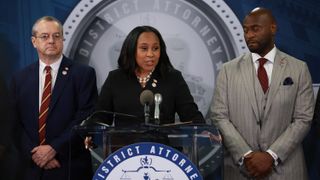The indictments in Georgia against former president Donald Trump cut to the heart of the matter – the core of the criminal and constitutional issues that led to the January 6 attack on the Capitol and the inevitable legal reckoning that has finally exploded this year.
For all of Trump’s abuses of power as presented by the House of Representatives in his two impeachments, for all the 30,000 lies he told during his presidency, for all the alleged grifting of presidential activity that resulted in millions of dollars of public funds being paid to Trump hotels and properties to enable Trump to conduct the duties of his office, for all the chaos and upheaval in his Cabinet and the revolving door replacements throughout the ranks of his senior staff, it is his efforts to overturn the 2020 presidential election that presented Trump’s most fundamental challenge to America’s democracy.
The indictments brought down in the January 6 indictments by Special Counsel Jack Smith paint a sweeping picture of Trump’s alleged attempts to pressure state election officials from certifying Joe Biden as the winner in states crucial to the election outcome, and to obstruct, especially through immense pressure by Trump on Vice President Mike Pence, the certification of results by preventing Congress from ratifying the 2020 election that Joe Biden won.
The indictments in Georgia gets this whole picture in one: they capture in exceptionally granular detail the 161 criminal acts allegedly taken by Trump and his associates to meet these ends. Prosecutor Fanni Willis makes clear the risk of Trump's actions to the sacred rite of democracy in her state and her intent to hold the former president and his allies to account.
It is his efforts to overturn the 2020 presidential election that presented Trump’s most fundamental challenge to America’s democracy.
From the moment the tape of the infamous phone call between President Trump, his chief of staff Mark Meadows and his attorneys asking Georgia’s Secretary of State Brad Raffensperger to “find 11,780 votes” was published by the Washington Post in January 2021, the gravity of what was being asked of Raffensperger – and therefore the threat for the first time in American history to the orderly transfer of power – was immediately apparent.
Can you imagine what would happen in Australia if a Prime Minister, trailing in the official vote count in, say, three key electorates whose outcome would determine which party keeps power in Canberra, called the head of the Australian Electoral Commission, Tom Rogers, and said, “Tom, you know I won those electorates. I just want to find the 580 votes in those three electorates, which would be enough to certify our victory.”
If such a call ever occurs, and it became public, the fallout will be catastrophic. I believe the PM would be ousted by the party that day and face prompt criminal proceedings.
Yet, in the United States, it has taken two and a half years for the US legal system to get to this point.
Georgia has two other elements that make this case so pivotal and different to the other three indictments.
First are the criminal racketeering laws in Georgia which permit bringing proceedings that capture several related actions into one massive criminal charge of conspiring to violate the law. Trump’s legal vulnerability is substantial.
The indictment alleges that Trump and the other 18 defendants – which include his consigliere Rudy Giuliani and his former chief of staff Meadows, and several of his lawyers – formed a “criminal organization whose members and associates engaged in various related criminal activities including, but not limited to, false statements and writings, impersonating a public officer, forgery, filing false documents, influencing witnesses, computer theft, computer trespass, computer invasion of privacy, conspiracy to defraud the state [and] acts involving theft and perjury.” A criminal enterprise is a fat target, and it is easily understood.
“So look,” Trump said in the call. “All I want to do is this. I just want to find 11,780 votes, which is one more than we have. Because we won the state.”
Second, court proceedings are routinely televised in Georgia. Indeed, the processing of the indictments was broadcast live to the world, with a judge signing the papers.
Right now on all things Trump, we have a court of law and a court of public opinion. The court of public opinion is all politics. Facing the court of law, Trump, who has locked in his base and the support of most Republican leaders, including most of his competitors for the 2024 presidential nomination, claims that he is a political victim, the indictments are designed to drive him out of the race and amount to one of the greatest case of political interference in US history. For Democrats who overwhelmingly believe Trump is unfit for office, the court of public opinion holds the former president must be tried and convicted, and must never return to power.
The court of law is all about justice. Televising the proceedings means these two courts can be fused -- everyone on all sides will see things in real time. This potentially public trial could, like the Watergate hearings against President Richard Nixon 50 years ago, and the January 6 House Committee hearings last year, help depoliticise this spectacle of a former president facing criminal charges and keep the focus of the trial more on the rule of law.
In the balance is a verdict of law, a verdict on America’s democracy and a verdict of history.






